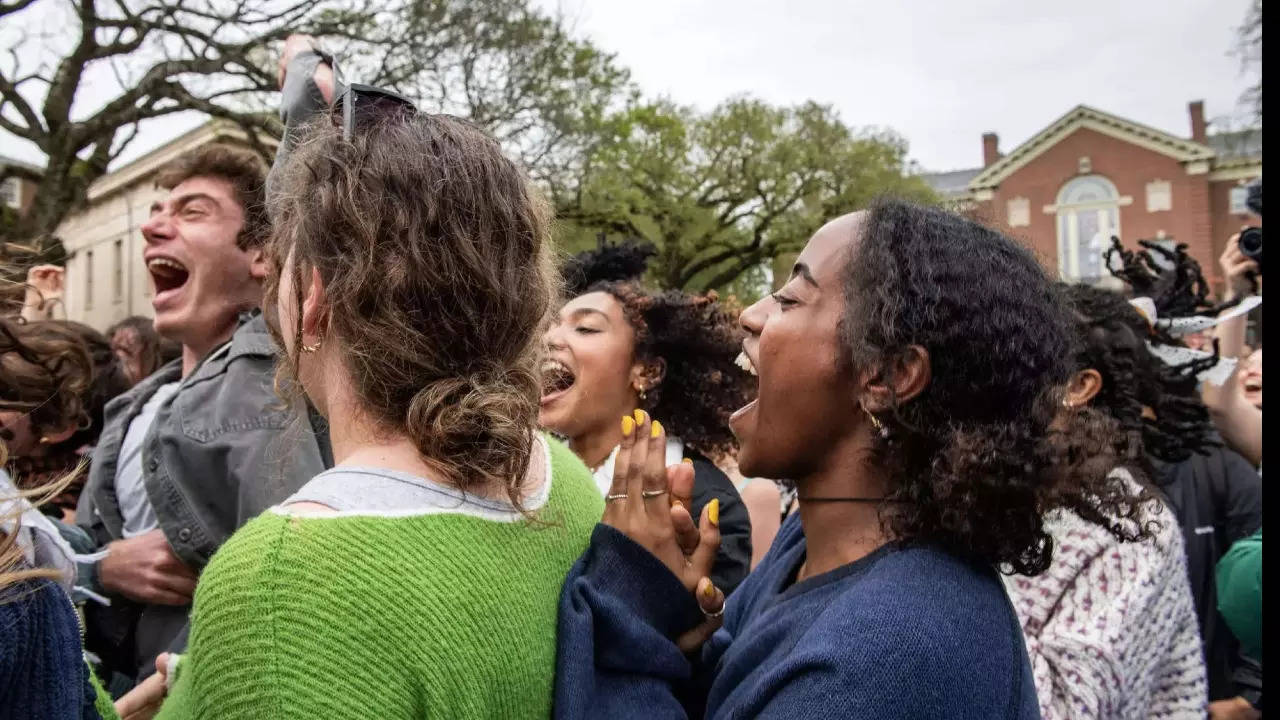NEW DELHI: In the aftermath of Hamas’s violent rampage through Israel on October 7, National Students for Justice in Palestine (NSJP), a leading anti-Israel campus organization in the United States, quickly mobilized to promote a “unity intifada” across American colleges. This movement, described in a strategic document obtained by the Washington Free Beacon, aims to support and “normalize” terrorist actions against Israel through coordinated protests and educational events.The group’s preparedness and immediate response suggest a premeditated plan to leverage campus networks to amplify pro-Palestinian and anti-Israel sentiment nationally.
The toolkit includes directives for “a sit-in, disruption, or educational event” and highlights NSJP’s encouragement of campus actions that defend and “normalize the resistance” against Israel. These activities, as per the toolkit, are part of a global “unity intifada” in which Palestinian students consider themselves active participants rather than mere supporters. The document explicitly positions Palestinian students as integral members of a global resistance movement rather than mere allies. This framing has prompted serious allegations in a recent landmark lawsuit filed by Israeli victims of the Hamas terror attack, accusing NSJP and its parent organization, American Muslims for Palestine (AMP), of providing material support to Hamas. The plaintiffs argue that the toolkit and the activities it promotes serve as a direct aid to Hamas’s propaganda and recruitment efforts on US soil, the Washington Free Beacon report said.
The swift assembly and dissemination of the NSJP’s “day of resistance” toolkit, just one day following the Hamas attacks, have drawn congressional attention and judicial scrutiny. Representative Tom Emmer highlighted the depth of the students’ involvement, criticizing their alignment with Hamas’s objectives. The case not only questions the legality of NSJP’s and AMP’s actions but also raises broader concerns about the influence of foreign conflicts on American university campuses. As these events unfold, they reveal the complex interplay between free speech, academic freedom, and national security concerns, especially when domestic organizations are perceived as extensions of foreign militant groups.
The toolkit itself advocates for what it describes as a righteous resistance against Israeli occupation, urging students to engage in actions that challenge Zionist presence and promote Palestinian liberation narratives. It even goes as far as justifying attacks on Israeli civilians by disputing their status under international law, a stance that has exacerbated accusations against NSJP of inciting violence and supporting terrorism. The ongoing legal and political fallout from NSJP’s campaign continues to stir debate on how US institutions and government entities should respond to campus groups that align themselves with internationally recognized terrorist organizations.
The toolkit includes directives for “a sit-in, disruption, or educational event” and highlights NSJP’s encouragement of campus actions that defend and “normalize the resistance” against Israel. These activities, as per the toolkit, are part of a global “unity intifada” in which Palestinian students consider themselves active participants rather than mere supporters. The document explicitly positions Palestinian students as integral members of a global resistance movement rather than mere allies. This framing has prompted serious allegations in a recent landmark lawsuit filed by Israeli victims of the Hamas terror attack, accusing NSJP and its parent organization, American Muslims for Palestine (AMP), of providing material support to Hamas. The plaintiffs argue that the toolkit and the activities it promotes serve as a direct aid to Hamas’s propaganda and recruitment efforts on US soil, the Washington Free Beacon report said.
The swift assembly and dissemination of the NSJP’s “day of resistance” toolkit, just one day following the Hamas attacks, have drawn congressional attention and judicial scrutiny. Representative Tom Emmer highlighted the depth of the students’ involvement, criticizing their alignment with Hamas’s objectives. The case not only questions the legality of NSJP’s and AMP’s actions but also raises broader concerns about the influence of foreign conflicts on American university campuses. As these events unfold, they reveal the complex interplay between free speech, academic freedom, and national security concerns, especially when domestic organizations are perceived as extensions of foreign militant groups.
The toolkit itself advocates for what it describes as a righteous resistance against Israeli occupation, urging students to engage in actions that challenge Zionist presence and promote Palestinian liberation narratives. It even goes as far as justifying attacks on Israeli civilians by disputing their status under international law, a stance that has exacerbated accusations against NSJP of inciting violence and supporting terrorism. The ongoing legal and political fallout from NSJP’s campaign continues to stir debate on how US institutions and government entities should respond to campus groups that align themselves with internationally recognized terrorist organizations.

